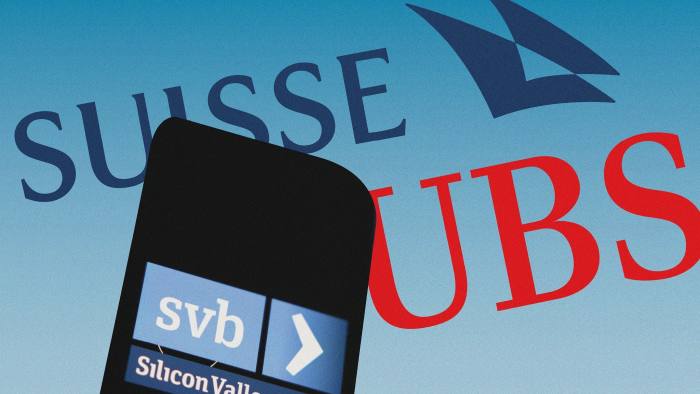Wall Street bank chief executives are trying to come up with a new plan for embattled First Republic after a $30bn lifeline failed to arrest a sharp sell-off in the lender’s shares.
The executives will discuss if anything more can be done for the California-based lender on the sidelines of a pre-planned gathering in Washington on Tuesday, which is being organised by the Financial Services Forum, one of the main industry lobby groups, according to people familiar with the matter.
Shares of First Republic, which have fallen by almost 90 per cent this month, closed down by 47 per cent on Monday despite an attempt by 11 banks to stabilise the lender by depositing $30bn last week.
That has prompted Jamie Dimon, the JPMorgan chief executive who spearheaded the deposit plan, to explore other options to support First Republic, one of the people said. One of the possibilities under consideration is converting all or a portion of their deposits into a capital infusion, another person said.
The FSF consists of eight banks, all of which contributed to last week’s lifeline. “The meeting this week was scheduled a year ago and will provide the members an opportunity to discuss the importance of our strong, diverse US banking sector, the state of the economy, and other important policy issues,” the FSF said in a statement.
Jane Fraser, the chief executive of Citigroup, is expected to attend the meeting in person, as is her counterpart at Goldman Sachs, David Solomon, the people said. The agenda of FSF-organised meetings is normally restricted to policy issues, but CEOs are expected to discuss options for First Republic on the sidelines of the gathering.
JPMorgan declined to comment.
The continued slide in First Republic’s share price on Monday came after its credit rating was cut for the second time in the space of a week following a flight of depositors who pulled tens of billions of dollars from their accounts.
First Republic bonds that mature in 2046 were down 11 per cent on Monday, trading at around 55 cents on the dollar. They traded above 75 cents as recently as early March.
S&P Global, on Sunday, downgraded the bank’s credit rating to B plus from BB plus — its second cut in a week — saying the $30bn lifeline from large US banks “should ease near-term liquidity pressures, but it may not solve the substantial business, liquidity, funding and profitability challenges that we believe the bank is now likely facing”.
Investors have been concerned about the health of regional banks following the failure of two banks, Silicon Valley Bank and Signature Bank, in as many weeks.
Those two banks as well as other regionals have had a rush of deposit withdrawals in search of safety, expedited in an era of digital banking. Many of those deposits have flowed to the biggest US banks such as JPMorgan Chase, Bank of America and Citigroup.
First Republic, which is battling to restore investor confidence, has lost about $70bn of deposits since the start of the year when they totalled $176.4bn, said one person briefed on the matter. The withdrawal figures were reported earlier by The Wall Street Journal.
The outflows have, however, slowed since First Republic announced $30bn in financial aid from 11 of the largest US banks, the Financial Times reported on Friday.
California-based First Republic on Sunday said the bank was “well positioned” to cover any short-term deposit activity.
Signature had lost $50bn in deposits, or nearly 60 per cent of money in the bank’s accounts, since the beginning of the year, according to numbers revealed on Monday from New York Community Bank, which is acquiring nearly all of the failed bank’s operations. Signature’s deposits totalled $88bn at the end of December.
NYCB said deposit outflow from Signature had been significant, but had “stabilised” in the past week. US regulators guaranteed Signature deposits after it was seized by the Federal Deposit Insurance Corporation. NYCB shares were trading up more than 30 per cent following the deal announcement.
At SVB, customers withdrew $42bn, a quarter of its total deposits, in the bank’s final day of operations, underscoring the swifter nature of a bank run when customers can pull money electronically.
Still, broader US market indices were slightly higher on Monday after the forced takeover of Credit Suisse by its local rival UBS showed that European authorities were acting decisively to prevent global contagion.
Banks in turmoil

The global banking system has been rocked by the collapse of Silicon Valley Bank and Signature Bank and the last minute rescue of Credit Suisse by UBS. Check out the latest analysis and comment here
US authorities over the weekend also tried to calm fears about the health of regional banks, saying the outflows of deposits had slowed.
The share prices of most regional banks that came under pressure last week were flat or higher, though they remain well below the levels before the recent banking turmoil.
Camden Fine, a bank industry consultant and former head of the Independent Community Bankers of America, said despite outflows at the larger regionals, the conditions at smaller banks seem to be stabilising.
“I have talked to dozens of community bank CEOs, and believe it or not in every case they have seen an inflow of deposits in the past week,” said Fine, who tends to work with banks with less than $10bn in assets.
Additional reporting by Harriet Clarfelt


